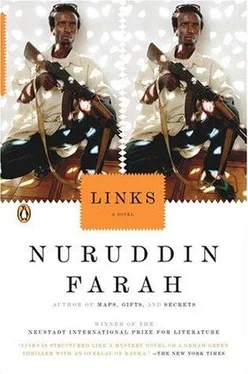Soon after his arrival, someone had said to him: “Our people are poor in their hearts. Our people are restless nomads in search of city-based fulfillment.” Jeebleh would be well advised to stay out of the people’s way, “as soon as the torch of ambition, backed by greed, begins to burn in their eyes.” He was damned if he could remember who had said this. It might’ve been Af-Laawe; it could equally have been Caloosha. That you could receive good wisdom from the mouths of bad men, never mind the names by which they were known or their main purpose in life, surprised him. He wished that he had shot back with a witty remark of his own, that whoever lets his dogs loose should prepare to feed them when they come back hungry. And he would add this for good measure: Take your cynical remarks and sprinkle them on your carbonara like the best Parmesan!
The muezzin called at dawn, and Jeebleh went to the hall where the imams were. He found them ready for a well-earned break. The head imam presented the prayers to Jeebleh, the official “owner of the corpse.” He received the blessings, his hands cupped, palms up, in the gesture of a devotee humbling himself before a deity. He handed over basketfuls of money to the head imam, relieved that the scholar had forgotten an earlier condition that he would arrange rides for each of them. When the imams left, Jeebleh returned to the apartment with the express aim of getting some sleep. And even though there was still no sign of Seamus, again he did not ask Bile if he knew where he might have gone. Bile was busy praying, and Jeebleh didn’t want to disturb him. Instead, Jeebleh went to sleep.
He woke up again at about eight in the morning.
AND HE WAS IN A MOURNING MOOD. HE WAS ALONE IN THE APARTMENT, AND took his time showering and shaving. He reminded myself of the tradition that a mourner desist as long as possible from changing his clothes. And so he wore the same clothes he had worn the day before, with the slight modification of a fresh pair of underpants.
When he walked to The Refuge, he knew he would have to take the rough with the smooth. As things stood, his own story lay in a tarry of other people’s tales, each with its own Dantean complexity. His story was not an exemplar to represent or serve in place of the others: it wouldn’t do to separate his from those informing it, or to rely solely on it for moral and political edification. Only when gathering the fragments together would he hold his mother’s tale in awkward deference, separating it from the others, giving it its deserved honor.
Jeebleh thought of how the country had been buried under the rubble of political ruin, and how Somalis woke to being betrayed by the religious men and the clan elders who were in cahoots with a cabal of warlords to share the gain they could make out of ordinary people’s miseries. The clan elders got their reward in corrupt gifts of cash; the religious elders, turning themselves into cabaret artists, conned the rest of the populace, as they carved an earthly kingdom for themselves. As Bile had put it, money was the engine that ran Somalia’s civil war. It stood to reason that money provided the cabals and the cartel with a ladder of lies, which allowed them to ascend out of harm’s way. Every other way of assessing the civil war was as futile as pouring wet sand through the interstices of history.
For what it was worth, Jeebleh held a childlike trust that things would work better for more people now that Raasta and Makka were back at The Refuge and Caloosha was out of the way. He trusted that things would improve if Af-Laawe followed in his mentor’s footsteps. Now, getting rid of Caloosha was no mean feat! Given the choice, Jeebleh would oppose all forms of violence. But what is one to do when there is no other way to rid society of vermin? Which would he rather be, someone who minds the opinion of others and advocates for peace, or someone who does what he can — despite the risks — to improve the lives of many others? Jeebleh would say, after Thomas Jefferson: “A little rebellion now and then is a good thing.” He would go even further and say, again after Mr. Jefferson: “The tree of liberty must be refreshed from time to time with the blood of patriots and tyrants. It is its natural manure.” So which would he rather be, someone who kills for justice, or someone helplessly unable to do anything? He would rather he killed than twiddle his thumbs, waiting for others to do the job. To hell with the opinion of others, especially his clansmen, who hadn’t the right to sit in judgment on his actions! Jeebleh was all for justice, by any means possible.
NOW HE WAS AT THE GATE OF THE REFUGE. AND A PARTY WAS IN FULL SWING, announced by placards bearing his mother’s good name, boldly written in Seamus’s upright hand, green on white, and on very fine material, similar to the subeeci-xariir cloth in which Somalis wrap the dead when burying them.
A billboard welcomed everyone to The Refuge—“a home to Raasta and Makka, and therefore a place of peace and communal harmony!” Another placard bragged that on entering the grounds of The Refuge, one would “spend a tranquil day among people living in harmonious coexistence with many others with whom they don’t share the same clan.” Yet another invited the visitor to a place where “even though the residents may not see things eye to eye, they stay together without pulling guns or rank on one another.” Tears welled up in Jeebleh’s eyes, and his cheeks became wet. How it would have pleased his mother, or Bile and Shanta’s, to be here. This, yes, was worth living for!
As he walked farther in, he chatted with the women who worked at The Refuge. They praised Seamus for the signs and for providing the children with their colorful balloons, and commended Bile for being there at all. One woman alluded to his half brother, and said that she hadn’t expected Bile to attend a party honoring the mother of a friend right after his own brother had been buried. Others spoke of Faahiye, of seeing him and Shanta holding hands and, trailing them, arms linked, Raasta and Makka. A woman Jeebleh didn’t know whispered to him that Caloosha’s widow was somewhere on the grounds, and not veiled. Apparently, she was chatting amicably to Raasta or entertaining Makka. Jeebleh was in no hurry to present himself to Caloosha’s widow. He made the acquaintance of a few other people, who said how pleased they were that Raasta was back, or how good Faahiye looked, or how nice it was to see a joyful Shanta.
Jeebleh was delighted to see the doors of the dormitories festooned with colorful flags. Where the children were playing in the courtyard, the sky rained a confetti of colors, which clung to his skin. Jeebleh allowed himself to frolic noisily with the children. He helped a young girl blow bubbles, and welcomed a hungry-looking a boy to eat his fill of meat to his heart’s content, probably for the first time ever. People mixing, chatting, and looking happy: Jeebleh was pleased to have contributed his small share as the host, and content that his mother had permitted him to use her death as the excuse.
But then, as though darkness had suddenly descended, his progress was impeded. Jeebleh had intended to go to where Bile, Seamus, Shanta, and Raasta were standing. He was prepared to talk to Caloosha’s widow. Yet he felt lost, unable or unwilling to decide which road to follow. Until a way was offered to him.
Dajaal was there. And he held Jeebleh by the elbow, as though propping him up. He was entreating Jeebleh to accompany him, he didn’t say where. Jeebleh remembered hearing that Dajaal had guided Bile to where Shanta was giving birth. How he wished he had the strength to ask Dajaal whether he had helped Bile do the bloody deed! Instead, Jeebleh took refuge in the variegated meanings of their silence, and silently followed Dajaal. He realized he was being led away from the others. As Jeebleh walked alongside Dajaal and Kaahin, with Qasiir and his posse bringing up the rear, he listened to their conspiratorial voices. One or the other of them spoke of how Af-Laawe had felt the heat and fled the city, how he had been seen in Nairobi buying a plane ticket to France.
Читать дальше












